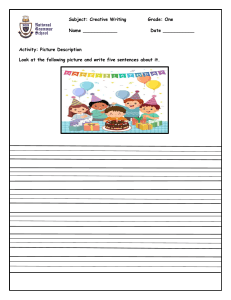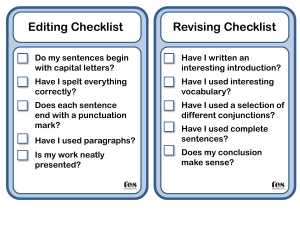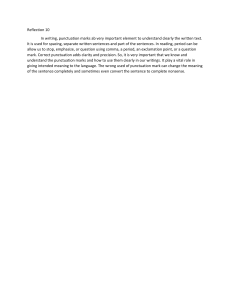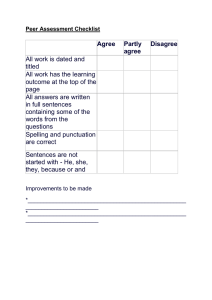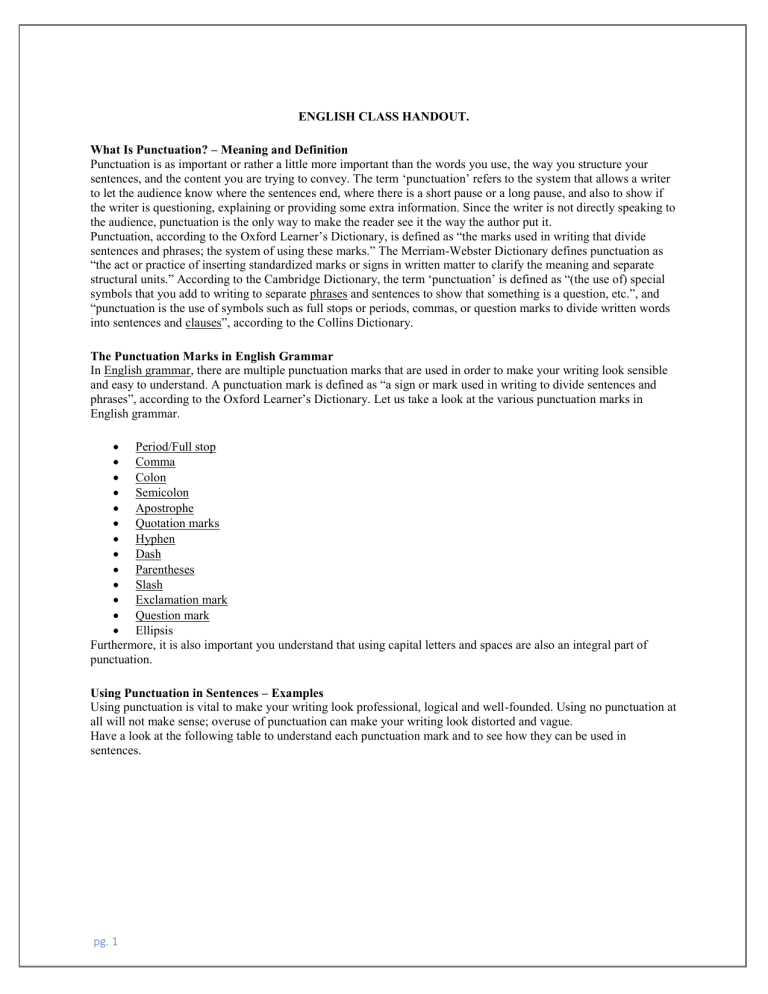
ENGLISH CLASS HANDOUT. What Is Punctuation? – Meaning and Definition Punctuation is as important or rather a little more important than the words you use, the way you structure your sentences, and the content you are trying to convey. The term ‘punctuation’ refers to the system that allows a writer to let the audience know where the sentences end, where there is a short pause or a long pause, and also to show if the writer is questioning, explaining or providing some extra information. Since the writer is not directly speaking to the audience, punctuation is the only way to make the reader see it the way the author put it. Punctuation, according to the Oxford Learner’s Dictionary, is defined as “the marks used in writing that divide sentences and phrases; the system of using these marks.” The Merriam-Webster Dictionary defines punctuation as “the act or practice of inserting standardized marks or signs in written matter to clarify the meaning and separate structural units.” According to the Cambridge Dictionary, the term ‘punctuation’ is defined as “(the use of) special symbols that you add to writing to separate phrases and sentences to show that something is a question, etc.”, and “punctuation is the use of symbols such as full stops or periods, commas, or question marks to divide written words into sentences and clauses”, according to the Collins Dictionary. The Punctuation Marks in English Grammar In English grammar, there are multiple punctuation marks that are used in order to make your writing look sensible and easy to understand. A punctuation mark is defined as “a sign or mark used in writing to divide sentences and phrases”, according to the Oxford Learner’s Dictionary. Let us take a look at the various punctuation marks in English grammar. Period/Full stop Comma Colon Semicolon Apostrophe Quotation marks Hyphen Dash Parentheses Slash Exclamation mark Question mark Ellipsis Furthermore, it is also important you understand that using capital letters and spaces are also an integral part of punctuation. Using Punctuation in Sentences – Examples Using punctuation is vital to make your writing look professional, logical and well-founded. Using no punctuation at all will not make sense; overuse of punctuation can make your writing look distorted and vague. Have a look at the following table to understand each punctuation mark and to see how they can be used in sentences. pg. 1 pg. 2 Read the story below and punctuate it where necessary she has broken three glasses within a week she thinks there is more to this story than meets the eye the first time was an accident the second time was a coincidence the third time was neither an accident nor a coincidence it was a premonition a message from the universe a warning that she had to open her eyes wide and pay attention to her surroundings each incident was unique but the consequences were the same deafening noise shattered glass momentary mayhem frantic attempts to bring everything back to order normalcy lately sleep has become elusive she dreads the times when the bedroom is plunged in darkness and she cannot see anything in those moments, time seems to drag by slowly she is happy when dawn finally creeps in softly reminding her that the world is beautiful and that her fear is unjustified there is a knock at the door good morning Madam the charcoal seller is outside he says that he has come for his money good morning ambewe alright tells him to wait a little i will be there in a minute as an afterthought she adds give him some of the porridge from the pot but don’t put sugar in its things are becoming so expensive nowadays and we cannot afford to waste food in this house okay Madam he says i will do that. Which plate should I use the plastic one ambewe how many times should I remind you that the ceramic plates are only for adults and visitors sorry madam forgot i will be in the kitchen if you need me ambewe is their houseboy he is not a boy as such he is a married man with three children his family is in the village and this job allows him to look after them in a more dignified way he can pay school fees buy seeds and fertilizer and purchase a few clothes and shoes once in a while in exchange for his salary he cooks washes the childrens clothes cleans their house takes care of the garden and protects the house from thieves when the owners are not around she does the shopping herself because it is wiser to do so when it comes to money, you should always trust your instincts pg. 3 Punctuation of Sentences The punctuation of a sentence depends on the type of sentence. One rule that applies to all sentences is the capitalisation of the first letter of every new sentence. The end of sentences is marked by punctuation marks such as a full stop, a question mark or an exclamation mark. A full stop is used at the end of assertive sentences and imperative sentences. Interrogative sentences end with a question mark, and exclamatory sentences end with an exclamation mark. While these are the basic punctuation rules, other punctuation marks like commas and semicolons are found between different clauses in compound and complex sentences. When you list something, you will have to separate them with commas. When you want to provide a list, introduce them with a short sentence and a colon to indicate the list. Go through the article on punctuation and capital letters in English to learn more about punctuation sentences. Examples of Sentences What are you doing? I am feeling sleepy. This game is interesting. Do not go that way. That really hurt! When is the next train to Hospet? We could not witness the sunset because we reached late. Though we had some discomfort, we enjoyed ourselves. Children generally like playing outdoor games. Scarlet and Nini are best friends. You can go through simple English sentences for more examples. Check Your Understanding of Sentences and Their Formation Unjumble the following sentences to form meaningful sentences. Also, punctuate them appropriately. 1. student/a/heera/grade/fourth/is 2. way/we/which/take/lotus/to/should/the/mahal/reach 3. was/mom/she/us/although/my/keeping/cooked/all/well/of/not/for 4.a/nearby/is/hospital/there 5. morning/i/up/chirping/woke/this/of/listening/the/birds/to/the 6. be/and/8/wake/ready/early/before/up 7. novel/the/small/arundhati/things/won/prize/1997/god/in/of/a/roy/the/booker pg. 4
